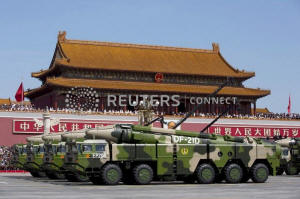|
U.S. eyes Taiwan risk as China's military
capabilities grow
 Send a link to a friend
Send a link to a friend
 [January 16, 2019]
By Phil Stewart [January 16, 2019]
By Phil Stewart
WASHINGTON (Reuters) - The United States is
closely watching Chinese intentions toward Taiwan, concerned that
Beijing's growing military prowess may increase the risk it could one
day consider bringing the self-ruled island under its control by force,
a U.S. official said on Tuesday.
The senior U.S. defense intelligence official, who spoke to reporters on
condition of anonymity, did not predict that China's military, known as
the People's Liberation Army (PLA), would take such a step but said such
a possibility was the top worry as China expands and modernizes its
military capabilities.
"The biggest concern is that ... they are getting to a point where the
PLA leadership may actually tell Xi Jinping that they are confident in
their capabilities," the official said, referring to China's president.
Pressed on whether the official was referring to Chinese confidence in
its capabilities to be able to successfully win a battle with Taiwan,
the official said, "Well, specifically that would be the most concerning
to me."

Taiwan is only one of a growing number of flashpoints in the U.S.-China
relationship, including a trade war between the countries, U.S.
sanctions on the Chinese military, and China's increasingly muscular
military posture in the South China Sea.
However, in meetings with Pentagon leaders, PLA officials have long
described Taiwan as China's most sensitive issue.
China has repeatedly sent military aircraft and ships to circle the
island on drills in the past few years and worked to isolate the island
internationally, whittling down its few remaining diplomatic allies.
It has also strongly objected to U.S. warship passages through the
Taiwan Strait this year, and issued a terse warning about Taiwan after
talks in Beijing on Tuesday with the U.S. Navy's top officer, Admiral
John Richardson.
'WHATEVER IT TAKES'
In the talks, Chinese General Li Zuocheng, chief of Chinaís Central
Military Commission Joint Staff Department, stressed that Taiwan was
"China's internal affairs" and that Beijing would allow "no external
interference."
"If someone tries to split Taiwan from China, the Chinese military will
do whatever it takes to safeguard national reunification, national
sovereignty and territorial integrity," according to an English-language
statement
[to top of second column]
|

Chinese military vehicles carrying DF-21D anti-ship ballistic
missiles, potentially capable of sinking a U.S. Nimitz-class
aircraft carrier in a single strike, travel past Tiananmen Gate
during a military parade to commemorate the 70th anniversary of the
end of World War II in Beijing Thursday Sept. 3, 2015. REUTERS/Andy
Wong/Pool/File Photo

Washington has no formal ties with Taiwan but is bound by law to
help it defend itself and is the islandís main source of arms. The
Pentagon says Washington has sold Taiwan more than $15 billion in
weaponry since 2010.
Xi has stepped up pressure on the democratic island since Tsai
Ing-wen from the pro-independence Democratic Progressive Party
became president in 2016.
On Jan. 2, Xi said in a speech that China reserved the right to use
force to bring Taiwan under its control but would strive to achieve
peaceful "reunification."
Still, the U.S. defense intelligence official cautioned against
over-reacting, noting Xi could believe he has plenty of time to
achieve reunification with Taiwan.
The official also cautioned that China's military still faced gaps
in its capabilities.
"They could order them to go today, but I don't think they're
particularly confident in that capability," the official said.
Also on Tuesday, the Defense Intelligence Agency released a report
describing Taiwan as the "primary driver" for China's military
modernization, which it said had made major advances in recent
years.
U.S. defense officials have become particularly alarmed about
China's advances in super-fast "hypersonic" technology, which could
allow it to field missiles that are far harder to detect.
"The result ... is a PLA on the verge of fielding some of the most
modern weapon systems in the world. In some areas, it already leads
the world," the report said
(Reporting by Phil Stewart; editing by Will Dunham and James
Dalgleish)
[© 2019 Thomson Reuters. All rights
reserved.]
Copyright 2019 Reuters. All rights reserved. This material may not be published,
broadcast, rewritten or redistributed.
Thompson Reuters is solely responsible for this content.

|